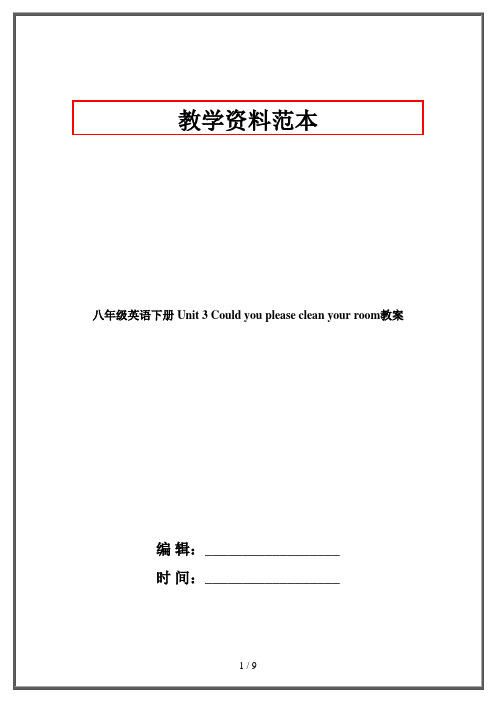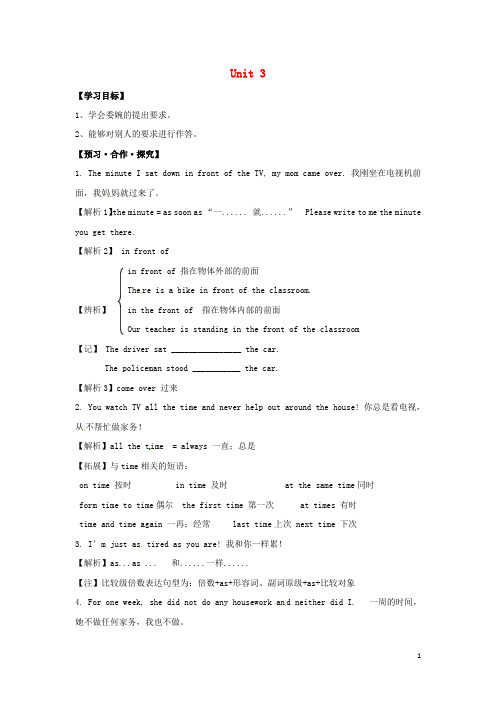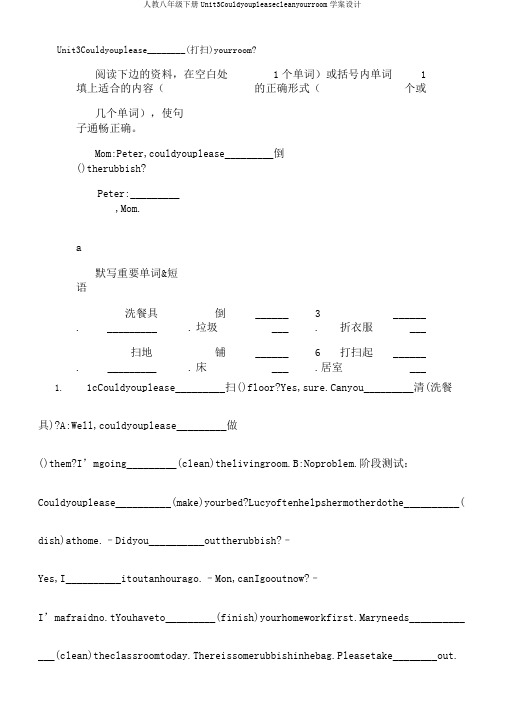八年级英语下册 Unit 3 Could you please clean your room学案3
- 格式:doc
- 大小:190.00 KB
- 文档页数:12

八年级英语下册 Unit 3 Could you please clean your room导学案(新版)人教新目标版you please clean your room学习目标知识目标1、重点词汇用法及短语动词用法。
如:rubbish, fold, sweep, floor,take out the rubbish, fold your clothes、、、2、情态动词could 的用法能力目标礼貌提出要求和请求准许情感目标学会照顾自己,培养自己的独立意识1)倒垃圾_______________2)叠衣服_______________3)扫地_______________4)整理床铺_______________5)洗碗____________________重难点Could you please take out the rubbish ?肯定回答________________________________________________________否定回答_________________________________________________________、1、____ ____ _____ take out the trash?我可以用一下你的电脑吗?_____ ____ use your computer? —Sorry、I’m ___ ____ work on it now、导与学过程根据句意、汉语意思和首字母提示完成句子。
1、The children are picking up the r_________(垃圾)in the river、2、 Children often help s__________(打扫)the rooms in the old p eople’s home、3、 There are some dirty clothes on the f_________(地板)in his bedroom、4、Tom’s room is really in a m________(不整洁)、5、-Mary, could you help f_________(折叠)the clothes?-Yes, sure、课后反思本课所得:本课不足:课后作业句型转换1、He has to clean his room himself、(疑问)____ he ____ ___ clean his room himself?2、Youd better take out the trash、(否定)Youdbetter ____ ____ out the trash、3、Its a very boring thing、(感叹句) _____ ____ ____ ____ it is!4、She cleans her room twice a week、(提问)________ ____ she ____ her room?5、They took some photos there、(否定) They ________ ___ photos there、6、Paul and Tom werent at school yesterday、(提问)___ ___ at school yesterday?7、A、 She was late yesterday because she was ill、B、 She was late yesterday ________ ________ herillness(病)、8、My mum asked me not to play computer、My mum asked me to ______ ____ computer、9、Can you come to my party on Monday at19:00?(同义)___ ___ ___ ____ cometo my party on Monday at19:00?10、Lets go fishing on Sunday、(同义)____ ____fishing on Sunday?第2课时Section A2a--2d学习目标知识目标1、重点词汇用法及短语动词用法。


Unit 3【学习目标】1、学会委婉的提出要求。
2、能够对别人的要求进行作答。
【预习·合作·探究】1. The minute I sat down in front of the TV, my mom came over. 我刚坐在电视机前面,我妈妈就过来了。
【解析1】the minute = as soon as “一...... 就......” Please write to me the minute you get there.【解析2】 in front ofin front of 指在物体外部的前面The re is a bike in front of the classroom.【辨析】 in the front of 指在物体内部的前面Our teacher is standing in the front of the classroom【记】 The driver sat ________________ the car.The policeman stood ___________ the car.【解析3】come over 过来2. You watch TV all the time and never help out around the house! 你总是看电视,从不帮忙做家务!【解析】all the t ime = always 一直;总是【拓展】与time相关的短语:on time 按时 in time 及时 at the same time同时form time to time偶尔 the first time 第一次 at times 有时time and time again 一再;经常 last time上次 next time 下次3. I’m just as tired as you are! 我和你一样累!【解析】as...as ... 和......一样......【注】比较级倍数表达句型为:倍数+as+形容词、副词原级+as+比较对象4. For one week, she did not do any housework an d neither did I. 一周的时间,她不做任何家务,我也不做。


Unit3Couldyouplease________(打扫)yourroom?阅读下边的资料,在空白处填上适合的内容(1个单词)或括号内单词的正确形式(1个或几个单词),使句子通畅正确。
Mom:Peter,couldyouplease_________倒()therubbish?Peter:_________,Mom.1a默写重要单词&短语1 .洗餐具_________2.倒垃圾_________3.折衣服_________4 .扫地_________5.铺床_________6.打扫起居室_________1.1cCouldyouplease_________扫()floor?Yes,sure.Canyou_________清(洗餐具)?A:Well,couldyouplease_________做()them?I’mgoing_________(clean)the livingroom.B:Noproblem.阶段测试:Couldyouplease__________(make)yourbed?Lucyoftenhelpshermotherdothe__________( dish)athome.–Didyou__________outtherubbish?–Yes,I__________itoutanhourago.–Mon,canIgooutnow?–I’mafraidno.tYouhaveto_________(finish)yourhomeworkfirst.Maryneeds__________ ___(clean)theclassroomtoday.Thereissomerubbishinhebag.Pleasetake________out.’待t在外边)late.(Itdangerous.’s –CouldIkeepthebookforaweek?–Sorry,I’mafraidyou________.–CouldyoupleaseteachmehowtoscanQRcode(扫描二维码)?Iwanttograbredenvelopes(抢红包).–Yes,I________.2cCouldI_________(使用)yourcomputer?’mgoing_________(work)onitnow.Well,_________IwatchTV?Yes,you _________,butfirstyouhaveto_________(cleanyourroom.2dSister:Tony,_________youpleasehelpout_________things?Brother:CouldI_________(起码)finish_________(watch)thisshow?Sister:No.IthinktwohoursofTV__________(be)enoughforyou!Brother:Fine.Whatdoyouwantme_________(do)?Sister:Couldyou_________(倒)rubbish,_________theclothesanddothe _________(dish).Brother?Somuch?Sister:Yes,_________Momwillbebackfrom_________(shop)anyminutenow.Andshe_________(not)behappyifshe_________(see)thismess.Brother:Butthehouseisalready_________cleanandtidy!Sis ter:Yes,well,it’s_________,_________it’snot“motherclean”3a_________(want)awalk,_________Iwastootire.I_________(throw)downmybad and_________(go)tothelivingroom.TheminuteI_________(sit)downinfrontof theTV,mymomcameover.“Couldyouplease_________thedogfora_________? sheasked.“CouldI_________(watch)oneshowf irst?”Iasked.“No!”shereplied_________(an gry).”YouwatchTV_________a ndneverhelpoutaroundthehouse!Ican’tworkalldayanddohouseworkallevening.”“Well,Iworkalldayatschool,_____ ____!I’mjustas_________(tire)asy ouare!shoutedback.Mymomdidnotsay_________(thing)andwalkedaway.Foroneweek,shedidnotdo_________houseworkand_________didI._________(final),Icouldnotfinda cleandishoracleanshirt.Thenextday,mymomcamehomefromwork_________(find)thehousecleanandtidy.“Whathappened?”sheaske d诧异地()“I’msosorry,Mom.I_________(final)understandthatweneed_________(share)thehousewo rk_________(have)acleanand_________(comfort)home,”Ireplied.3b._________ofusdidanyho useworkforaweek.Mymom_________(come)assoonasIsatdowninfrontoftheTV.3.You’retired,bu tI’mtired,_________.3c,写出以下单词的词性并分别造一个句。

八年级英语下册 Unit 3 Could you please clean your room Period 3说课稿一. 教材分析八年级英语下册Unit 3 Could you please clean your room? Period 3是一节以日常交流为主题的英语课。
本节课的主要内容是学习如何用英语提出建议和请求,以及如何礼貌地回应。
教材通过一个关于孩子们做家务的对话,让学生们掌握情态动词“could”的用法,并学会在实际生活中运用英语进行交流。
二. 学情分析八年级的学生已经掌握了基本的英语语法和词汇,具备一定的听说读写能力。
他们在日常生活中也了一定的英语实践经验,但仍然需要大量的练习来提高口语表达能力和听力理解能力。
此外,学生们的学习兴趣和动机对英语学习效果有很大影响,因此,在教学过程中要注意激发他们的学习兴趣。
三. 说教学目标1.知识目标:让学生掌握情态动词“could”的用法,学会用英语提出建议和请求,并能够礼貌地回应。
2.能力目标:通过课堂活动,提高学生的口语表达能力和听力理解能力。
3.情感目标:培养学生热爱生活、关心他人的品质,以及积极承担家务的责任感。
四. 说教学重难点1.重点:情态动词“could”的用法,以及如何用英语提出建议和请求。
2.难点:在实际生活中运用英语进行交流,特别是在不同情境下正确使用“could”。
五. 说教学方法与手段1.情景教学法:通过设置现实生活中的情境,让学生在实际语境中学习英语。
2.交际教学法:引导学生参与课堂互动,提高他们的口语表达能力和听力理解能力。
3.任务型教学法:通过完成具体任务,让学生在实践中学会使用英语。
4.利用多媒体教学手段:播放音频、视频材料,丰富教学内容,提高学生的学习兴趣。
六. 说教学过程1.导入:以一个关于孩子们做家务的短剧引入课堂,激发学生的学习兴趣。
2.新课呈现:通过展示教材中的对话,让学生了解本节课的主要内容。
3.课堂互动:分角色朗读对话,进行情景模拟,让学生在实际语境中学习英语。
初中英语人教新目标八年级下册教案Unit 3Could you please clean your room? SectionA 2Unit 3 Could you please clean your roomSection A-2一、Teaching aims.(教学目标)1. 语言目标:继续探讨做家务的词汇,及如何有礼貌地提出要求。
2. 技能目标:能自由和搭档谈论做家务的话题;能默写重点单词和重点句型。
3. 情感目标:培养学生爱劳动,分享家务的能力。
二、Important and Difficult points.(教学重难点)1. 教学重点:1) 掌握本课时出现的生词及表达方式。
2) 阅读短文,获得相关信息,提高学生们的综合阅读能力。
2. 教学难点阅读2b部分的短文并完成相关要求。
三、Teaching method.(教学方法)TBLT 任务教学法、合作学习四、Teaching design.(教学设计)RevisionPractice the conversations we have learnt before.e.g. A: Could you please take out the rubbishB: Yes, sure./ Of course./ All right. /OK./Sorry, I can’t. I have to do my homework./Sorry, I can’t. I am doing the dishes.Listening 2a&2bPeter asks his father if he can do four things. What does his father say Check (√) “yes” or “no”. Listen again. Draw lines to the reasons.Peter wants to … Peter’s father says … His father’s reasonsgo out for dinner. Yes No I have to do some work.go to the movies. Yes No You have to clean your room. stay out late. Yes No I need to eat breakfast.get a ride. Yes No You have a basketball game.Practice2c Make conversations using the information in 2a and 2b.A: Could I use your computerB: Sorry. I’m going to work on it now.A: Well, could I watch TVB: Yes, you can. But first you have to clean your room.2d Role-play the conversation.Language points1. Tony, could you please help out with a few thingshelp out 动词短语,表示在某人繁忙或遇到困难时“给予帮助”。
Unit 3 Could you please clean your room?Section A 第1 课时(1a〜2d)自主学习方案1.自学生词,并记住拼读及拼写。
2.预习课本,找出重点短语及句子。
3.读记后完成自学导练作业。
课堂导学方案Step 1情景导入T:Boys and girls,what housework do you help your mother with?S1:I do the dishes.S2:I help my mother wash clothes.…T :Very good . We are old enough to help our parents do some housework. Now please look at the pictures,and we will learn how to express them in English.环节说明:通过师生问答这个过程,学生复习了表示家务劳动的短语,同时加入图片导学新内容,引起学生的学习兴趣。
Step 2完成教材1a—1c的任务1.学生朗读1a中的短语,教师纠正错误读音,然后学生识记单词并且两人一组互相提问。
2.仿照参考案例的形式两人一组互相询问对方是否做这些家务。
参考案例A:Do you do the dishes?B: Yes,I often do the dishes. What about you?A:I do tt two days a week.…3.听录音,标注出Peter和他妈妈做的家务。
4.再听一遍录音,并跟读对话。
5.分组练习1c中的对话,并请一些学生表演出他们的对话。
然后利用1a中的短语模仿1c的对话编新对话。
6.小结训练。
( A )(1)—Could you please do the dishes,Lana? I’m cleaning the room.—.A Yes,sureB . Yes,you canC. No,thanksD. No,you can^tC ) (2)—Could you please when you go out?—I’m sorry,I .A.take in,mustn’tB.put out,couldn’tC . take out,can’ tD. look out,shouldn’t环节说明:听说结合,第一时间向学生传达语言目标,通过分组对话练习和小结训练,使语言目标得以强化。
人教版八年级英语下册《Unit3 Could you please clean your room》说课稿(第2课时)一. 教材分析人教版八年级英语下册《Unit3 Could you please clean your room》是本单元的第二课时,主要围绕着“请求和提出建议”这一主题展开。
通过本节课的学习,学生能够熟练运用情态动词“could”来提出请求和建议,并能听懂、会说、会写与房间清洁相关的词汇和句子。
教材内容丰富,实用性强,有利于激发学生的学习兴趣和积极性。
二. 学情分析八年级的学生已经具备了一定的英语基础,对于日常生活中的基本词汇和句型有所了解。
但他们在语言表达上还存在一定的问题,如词汇量不足、语法掌握不牢固、口语表达能力欠佳等。
因此,在教学过程中,我们需要关注学生的个体差异,因材施教,尽量调动他们学习的积极性和主动性。
三. 说教学目标1.知识目标:学生能够掌握情态动词“could”的用法,学会提出请求和建议;能够听懂、会说、会写与房间清洁相关的词汇和句子。
2.能力目标:通过小组合作、讨论等方式,提高学生的口语表达能力和团队协作能力。
3.情感目标:培养学生养成良好的生活习惯,树立环保意识。
四. 说教学重难点1.教学重点:情态动词“could”的用法,与房间清洁相关的词汇和句子。
2.教学难点:情态动词“could”在实际语境中的运用,以及如何正确提出请求和建议。
五. 说教学方法与手段1.情境教学法:通过设置生活情境,让学生在实际语境中感受和掌握情态动词“could”的用法。
2.交际教学法:利用小组讨论、角色扮演等方式,提高学生的口语表达能力和交际能力。
3.任务型教学法:设计各种任务,让学生在完成任务的过程中,自然地学习和运用所学知识。
4.多媒体教学手段:运用课件、视频等多媒体资源,丰富教学内容,激发学生的学习兴趣。
六. 说教学过程1.导入:通过提问方式,引导学生谈论日常生活中的房间清洁习惯,自然引入本节课的主题。
八年级下册Unit 3 uld u please leanur r? 导学案分析八年级下册Unit3uldupleaseleanurr?导学案分析StudingAis(学习目标)BeabletreadthenerdsblingattheprnuniatinAsstudentstsitellandhetherdsitheahtherStudingpreduresStep2:Sh“Studingais”Step3:Guidene(自学指导一)Readandunderstandtherdsblingattheprnuniatin2抽读、正音、领读、齐读3Finish1abritingdnAfralas,Ufrusuall,frften,Sfrsetie s,HEfrhardleverandNfrneverStep4:GuideT(自学指导二)ListenandhePeter’stherrPeterilldthesehres听力策略:听前让学生预测可能听到的结果,诱发其好奇心和兴趣;听中,捕捉家务名称和说话人的语音语调;听后,用完整的句子说出答案,旨在练语言、用语言。
2ListenandreadalngthetapeStep:GuideThree(自学指导三)Readthenversatinin1aandtranslateitbtheselvesaepliterequests:pare:uldupleaseseeptheflr?anudthedishes?Thin:hihsundsreplitetu?情态动词an和uld均可用来提出要求,但uld 较为委婉、客气。
ulduplease+…?是一个礼貌、委婉地提出要求的句式,其后加动词原形即可。
‚注意在回答时,uld要用an代替。
2Pratiereading3aenversatinsabutthehresin1aStep6:GuideThree(自学指导三)ListenPeterasshisfatherifheandfurthingshatdeshisfat hersa?heesrn听力策略:听前,仔细观察图片,识别人物关系及对话地点,然后浏览表格中信息,明确每个短语的意思,扫清听力障碍)Ntes:stautlate;3Listenandhe4aenversatinsbeteenPeterandhisfatherStep7:ExerisesinlassPleasereiteandditatethefllingrds,phrasesandsentenes(背诵并默写下列单词、词组和句子。
1 Unit 3 Could you please clean your room? (第一课时) Unit 3SectionA1a-2d 【学习目标】 1.掌握1a-2d的词语 2.学习提出礼貌的请求和请求允许; 3.学会使用句型Could you please...?和Could I...?; 【学习重点】 掌握一些家务活动相关的动词短语。 掌握情态动词could的用法和助动词do的用法。 【学习难点】 掌握情态动词could的用法和助动词do的用法 【学习过程】 【一】自主学习 明确目标 1 试读单词,解决语音问题,联系有关旧单词 2 查阅下面的短语动词 1) 出去吃饭_____________ 2)在外面待到很晚_______________ 3)去看电影_______________ 4)搭车_______________ 5)完成做某事_______________ 6)干净整洁____________ 7)洗餐具_______________ 8)倒垃圾_______________ 9)叠衣服_______________ 10)扫地_______________ 3.观察以上词组的构成方式: 【语言点】 1. —Peter, could you please take out the trash?请你把垃极倒掉好吗? —Sure, Mom.可以,妈妈。 —Could you please do the dishes? 请洗盘子好吗? —Sorry, I can’t. I have to do my homework.抱歉,我不能。我得做作业。 (1)在表示请求帮助或请求允许的疑问句中,常用could代替can,以表示礼貌,委婉或不确定的语气,而can则不具备这些语气。这种情况下不能把could看作can的过去式。以上两句中用could 2
是为了表示礼貌的请求。表示请求帮助或请求允许时,除了can, could之外,还可以用may,句子的表达方式也各有不同,可以用不同的方式来表示同一个概念。例: ①Could/Can/May I use your car for a day? ②I wonder if I could use your car for a day? ③Do you mind if I use your car for a day? 对于①、②句所作允答可以各种各样,如同意可以说Yes,或Sure或Certainly,还可说Yes, (do) please. 或Of course. (you may/can). 或That’s OK/all right. 如果不同意,可以说I’m sorry you can’t. 或I’m really sorry, but I have to use it today. 要避免说No, you can’t. 这样显得很不礼貌。否定回答通常用委婉语气。对于句(3)所作回答可以说Never mind. /Not at all. 表“不介意”。不能用Yes. /Sure. /Of course. /Certainly.等。 无论肯定还是否定应答中,要避免使用could,要用can或may。因为应答须用确定的语气。而could在表请求的问句中是为了表示礼貌或委婉语气,用在应答中则成了不确定语气,与情理不符。所以应答中不说Yes, you could.或No, you couldn’t. 而要说Yes, you can. 或Sorry. /No, you can’t. (2).区别动词do和make。 “do”与动作及非实质性的事连用,与词尾是-ing的动作名词连用,如:do the dishes(洗餐具),do my homework(做我的家庭作业),do chores(做家务,处理琐事),do the laundry(洗衣),do the shopping(购物),do some reading(读书) “make”表示“做、制造”、“整理”、“冲、泡(饮料)”等,如: make your bed(铺床),make breakfast(做早餐),make dinner(做晚饭),make tea(泡茶,沏茶),make myself a cup of coffee(给自己冲一杯咖啡) 5.通过预习你还有什么不懂的地方吗?
【2】借助媒介 正音操练 1.热身活动:Talk about some chores. Games:练习有关家务的短语。 Bed, bed, make the bed; Floor, floor, sweep the floor; Dishes, dishes, do the dishes; Clothes, clothes,fold the clothes; 3
Rubbish, rubbish, take out the rubbish; Chores, chores,I like doing chores. 2.借助图片熟读动词短语并完成1a.。 3..听1b找出妈妈和Peter要做的家务劳动并跟读。
【3】合作探究 展示提升 1.小组讨论。What kind of chores Peter and his mom will do? 小组讨论怎样回答。 2.小组活动编对话 3.听力:先阅读2a题中Peter的父亲拒绝的理由。 然后听2a, 2b。完成练习并核对答案。 4.小组合作做2c。 5.分角色表演2d, 小组讨论解决疑难问题。 【4】达标检测 盘点收获
一、根据句意、汉语意思和首字母提示完成句子。 1.The children are picking up the r_________(垃圾)in the river. 2.Children often help s__________(打扫)the rooms in the old people’s home. 3.There are some dirty clothes on the f_________(地板)in his bedroom. 4.Tom’s room is really in a m________(不整洁). 5.---Mary, could you help f_________(折叠)the clothes? ---Yes, sure. 二、根据汉语意思完成句子,每空一词。 1.Linda often helps her mother________ _______ ________(洗餐具)after dinner. 2.Jack, remember to_______ _______ _______(整理床铺)after you get up. 3.---Could I_______ ________ ________(搭便车)to the center of the city? ---Certainly, please get into the car. 4.We can’t______ ______ _______(在外面待到很晚)on weekdays. 5.---Lucy, have you finished_______ _______ ________ ________(打扫客厅)? ---Sorry, I’ll di it at once. 三.选择填空。 4
( )1.---Could you please turn off the light? ---__________. A.Yes, I could B.No, I couldn’t. C.It doesn’t matter. D.Yes, sure. ( ) 2.---Could I look at your pictures? ---Yes, of course you_______. A.should B.could C.will D.can ( ) 3.---Could I use your computer,Jim? ---Sorry, I’m going to ________now. A.work on it B.work it on C.work out it D.work it out ( ) 4.---Mum, Could I finish________ the football match? ---No, you have to do your homework first. A.watch B.to watch C.watching D.to watching ( ) 5.There are some books in the box. Could you please_________? A.take it out B.take them out C.take out it D.take out them
【学习反思】 5
Unit 3 Could you please clean your room? (第二课时) 课题 Unit 3 SectionA3a-4c 【学习目标】 1. 能读懂短文并会做相关练习; 2.能够理解文中词语并进行写的训练; 3.能正确区分提出有礼貌的请求和征求允许的句型,并选出正确的答语。 【学习重点】 1.能够理解文中词语并进行写的训练; 2.能够学会对提出有礼貌的请求和征求允许的句型以及如何礼貌应答进行总结。 【学习难点】 对提出有礼貌的请求和征求允许的句型以及如何礼貌应答进行总结。 【学习过程】 【一】自主学习 明确目标 一、预习3a-4c.完成下列翻译练习 1. 扔下_______________ 2.带某人去散步_______________ 3.整曰/夜_______________ 4.做家务_______________ 5.闲逛_______________ 6.把某物传给某人_____________________ 7.把某物借给某人_______________ 8.讨厌做某事_______________ 9.做杂务_______________ 10.帮助某人干某事_______________ 二、认真观察Grammer Focus总结提出有礼貌的请求和征求允许的句型以及如何礼貌应答。 三、知识点提示: For one week, she did not do any housework and neither did I. 她一个星期没做家务,我也没做。 用法:neither在句中是副词,意为“也不”,放在句首,表示前面否定的内容也适用于另一个人或物,句子须采用部分倒装。此时也可用nor替换neither使用。如:You didn’t see him,and neither did I. 你没有看见他,我也没有。 拓展:neither其他用法:(1)neither用做形容词,表示“(两者)都不”,置于单数名词之前。如:Neither chair is comfortable.两把椅子坐起来都不舒服。 (2)neither用做代词,表示“两者都不”。如:Neither of my parents enjoys music.我父母都不喜欢音乐。 (3)neither用做连词,常用在短语neither...nor...中,意为“既不......也不......”,